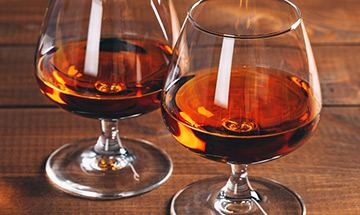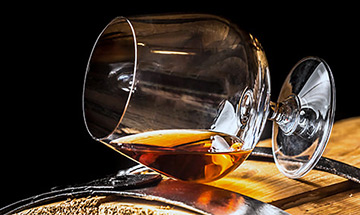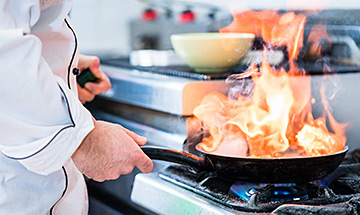Contents
Cognac is a type of brandy from France that goes under the same name. You can easily find it in most grocery stores. Since it features an extensive double-distilled dilution process, Cognac tends to be pricey for most of us. For this reason, among others, you may want an affordable substitute for Cognac. Also, those seeking to achieve an alcohol-free diet may desire other alternatives. You can use it to add flavor to food. If you do not drink alcohol, look no further than juices from peaches, apricots, or pears. If you don’t mind using alcoholic replacements, you may need to consider fruit juices, sherry, whisky, and wine.
Tend to get more information about cognac substitutes, read on.
What Is Cognac?

Picking the name from its place of origin, Cognac, South-Western France, this type of brandy undergoes a unique ageing process. Made primarily from grapes, this spirit contains an alcohol percentage of at least 40%. In addition to being distilled twice, it also requires a minimum of two years of aging in oak casks, among other requirements for the drink to be considered as a cognac. This includes passing all the requirements by BNIC (Bureau National Interprofessionnel du Cognac), such as the alcohol percentage and storage location.
Also known as eau de vie (this term is used for distilled Cognac only), the drink is produced by distilling white wine instead of red from several regions. These geographic designations include Petite Champagne, Fins Bois, Bois Ordinaries, Bois a terroirs, Bons Bois, Grande Champagne, and Borderies.
Such strict requirements for producing Cognac make it quite an expensive drink. Thus, you may want a suitable alternative if you don’t wish to spend your hard-earned money on a bottle of Cognac. There are different types of Cognac, depending on how long their aging process took. This includes VS, VSOP, and XO cognacs which you will see on a bottle.
Fortunately, cognac is similar to Brandy, bourbon, rum, and whiskey. Whether you want to use it in a recipe or use it as a drink, here is a comprehensive list of substitutes for Cognac that you can try.
What Is Cognac Similar to?
Cognac is similar to whisky. However, whisky is made from grain such as barley, while cognac is made from grapes. But both can be used as drinks and flavors.
Why Should You Substitute Cognac?

There are numerous different reasons why you would consider using a cognac substitute. Here are some of them:
- Cost: Due to its strict production requirements, many people may find Cognac quite expensive, making it difficult to find any brand within budget. As a result, many may find this unnecessary, especially if you plan to use it for cooking only.
- Alcohol-free diet: Since there is still a large population out there that does not drink alcohol, Cognac may be out of the question for some people. As a result, those looking for alcohol-free content may want a substitute for Cognac in recipes.
- Flavor: In some cases, you may find that the drink’s flavor is too strong, thus seeking a lighter substitute for Cognac.
Alcoholic Cognac Replacements
You can use sherry, brandy, or white wine as a cognac alternative. For drinks, you can use brandy which works well in cocktails, but you can also sip it on its own. Those looking for a fancier drink such as a digestif should consider Armagnac or Armenian Cognac. Here is an exhaustive list of alcoholic replacements for Cognac.
Brandy
Similar to how sparkling wine and champagne compare, brandy and Cognac also share a lot in common. Besides the differences in their prices and restrictions on its production, brandy and Cognac are essentially the same. Although those with a sharper palate might notice the different sensory experiences in the two drinks, the difference may go largely unnoticed to most of us. As a result, you can use brandy to substitute for Cognac when preparing chicken or beef stroganoff.
No one will be able to note the difference when using brandy as a substitute for Cognac in a cocktail, in a desert for enhanced flavor, or when cooked off in a sauce. However, ensure that you confirm the brandy’s label to avoid using flavored varieties such as apple or peach brandy. Such flavored varieties may taste out in your recipe.
You can also use brandy for flambéing and deglazing. For this type of cooking, ensure that your bottle of brandy is 80-proof alcohol. Although you can use most types of domestic brandy as a cognac substitute cooking, ensure that you can drink the spirit first. Suppose you can’t, then reconsider your decision to use it in your cooking. For cooking, consider using Korbel, which, in addition to being affordable, enhances the taste of meals. For drinking, try Brandy de Jerez that is heavier than Cognac as well as sweeter since it is made from faster-maturing grapes.
Armagnac

If you are looking for a substitute for Cognac as a digestif, consider using Armagnac, which is a unique brandy type produced in the Armagnac region in Gascony, Southwestern France. Although the drink features a lower alcohol content compared to Cognac, one upside is that it tends to have a drier taste and a more complex flavor.
Alternatively, consider a cheaper brandy for a cognac cooking substitute since most of the flavor will get lost during the cooking process. Armagnac is best-known for its robust flavor, and the fact that it is a top-shelf drink makes it a favorite for many.
Whiskey
If you want to enjoy a bottle of quality spirits but lack the capabilities of forking out on Cognac, then consider a good quality bottle of bourbon, rum, or even scotch. They offer an enhanced flavor, mainly when used in Tiramisu or desserts. Similarly, you can try these options if the taste of Cognac doesn’t appease your appeal and you need something different. Although you could use scotch in cooking, I would suggest cheaper alternatives that can have similar outcomes.
Sherry
Sherry, a Spanish drink, consists of fortified wine which bears a nutty and dry fruit flavor. To use sherry as a replacement for Cognac, look for better quality dry variety instead of those with a “cream sherry” label. You can use the drink to replace Cognac for cooking, and it has great results when added to a beef stroganoff or coq au vin. For great results, consider adding sherry in a slow-cooked meal which diminishes the flavor leaving you with a delicious meal.
Wine
You can use white wine as a substitution for Cognac in recipes such as gravy, among other sauces. Also noted for being relatively inexpensive, wines such as Pinot Grigio or Sauvignon Blanc are beneficial in several applications.
Also, you can use a medium or full-bodied wine that is not entirely sweet for cognac substitute cooking. All the same, I recommend that you don’t use wine varieties such as chardonnays since they tend to become astringent and bitter when reduced by heat. Similarly, stay clear of bold wines such as Shiraz since they also alter food flavor when cooked.
Non-alcoholic Cognac Alternatives
If you are more into alcohol-free content, numerous cognac replacements do not disappoint. Although it may involve a little experimentation, it is worth the effort since you can come across something exceptional. Below are some of the tested non-alcoholic ingredients that you can use as a substitution for Cognac in cooking or as a drink.
Fruit Juice
For a long time, fruit juice has been used as a no-alcohol substitute for Cognac in cooking. Examples of options include apple, peach, pear, or apricot juice which you can use in equal quantities as the original cognac drink. Avoid using fruit juice with sugar since they tend to make the food to suit, which sometimes ruins the whole meal. If you wish to make a sauce, consider adding a little water to dilute the juice’s sweetness.
And since juices are generally affordable as well as easily accessible, watch out for the many varieties that flood the market. You can also use your juicer to make one at home. Although choosing the flavor depends entirely on you, the best-known options that have proven excellent for all types of meals, such as fried steaks, include peach and apple. Also, fruit juice is a perfect cognac substitute for desserts, gravy, deglazing, and sauces. You can either add cooking vinegar or wine to achieve the desired level of acidity.
Non-alcoholic Brandy Extract
Another quality alcohol-free option to use as a cognac alternative is brandy extract. You can use it in desserts, baking recipes, or cocktails to achieve additional flavor. For desirable quantities, replace one tablespoon of Cognac with one teaspoon of brandy extract when cooking. Baking recipes, however, require you to use the extra liquid.
Cooking Wine and Sugar
Although we can’t categorize it as 100% alcoholic, cooking wine loses most, if not all, of its alcohol content when heated. As a cognac replacement for cooking, you can use cooking wine and sugar in desserts gravy or even steak au poivre. Here, use two teaspoons of brown sugar and one cup of cooking oil for every cup of Cognac needed.
Summary of Cognac Substitutes and Their Uses
There are no limitations in what you can or cannot use as a suitable substitute for Cognac in recipes. Nevertheless, below is a list of the best suggestions to help you choose the perfect substitution for Cognac.
| Cognac substitute | Use |
| Sherry, Brandy | Desserts |
| Brandy, Bourbon, Port, Whiskey, or Rum | Cocktails |
| Brandy | Chicken |
| Sherry, Brandy | Beef stroganoff |
| Fruit juice, Brandy extract | Non-alcoholic |
| Brandy, Sherry | French Onion soup |
| White wine | Steak au poivre |
| Rum, Brandy | Tiramisu |
| Armagnac, Armenian | Digestif, as a drink |
| Cooking wine | Gravy |
How To Use Cognac Substitute for Dishes?
Professional chefs consider flambe as one of the essential cooking techniques. Using this cooking method with any cognac alternative reduces the pungent odor and improves the inherent aroma of your food. Besides, it can be exciting to see how flambe works when wine burns up in a fire, and the food does not burn. To do this, pour alcohol on the food’s surface and light the sauce to change its chemical composition. Flambe causes a unique chemical reaction that occurs when the surface temperature of the food exceeds 240°C.
Conclusion
Finding a quality substitute for Cognac is generally straightforward. And since Cognac is a type of brandy, it is interchangeable with brandy, and one can substitute the other. With compatibility and flavor profiles in mind, you can go with the above recommendations or come up with creative replacements.







